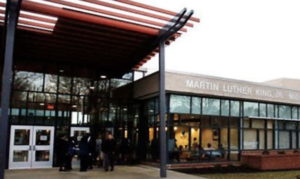
by James C. Sherlock
I have crafted and will share what I believe to be an epitaph for public education in Virginia.
All of the evidence we see is that Virginia’s public school system, counseled and cheered on by its disgraceful publicly funded schools of education, is crumbling at its foundations.
We start children in school at ever younger ages to give them a head start. We have moved supervision of child care to the Department of Education, thus rearranging the deck chairs.
Many of the adults in the system, and quite possibly many of the students, have given up on education in actual facts. Adults argue about the teaching of history as if, evidence aside, kids were going to learn it.
Displacing traditional course time, teachers are directed to spend dedicated hours to try to instill social-emotional learning that kids traditionally learned at home.
Those kids who already have those skills sit wondering what they have done wrong.
The lessons plans, unfortunately, will tell them soon enough.
But that is just the beginning.
Many school divisions will not remove troublemakers from the classroom or school lest they seem unfair, thus being overwhelmingly unfair to those kids who want to learn and teachers who want to teach.
Self-described “sensitive” divisions do that to try to give the troublemakers self-esteem. Many of those kids wind up in the criminal justice system anyway, but presumably feeling better about themselves. Hopefully before they wound or kill a teacher or another student or deal fentanyl to a classmate.
A singular goal of some less ambitious adults is, apparently, that their kids just not be arrested at school — that they not become part of what “advocates” have named a “school-to-prison pipeline.”
They can’t deem it a “home-to-prison pipeline.” That would harm the fragile self-esteem of the caregivers. And of school board members for whom the caregivers vote.
As was noted recently with seeming wry amusement by city of Richmond school board members, daytime crime surges when children of a local middle school they named are not in school.
The dismal data and trends on state and federal achievement tests are testimony to collapse.
So, as a solution, “advocates” are working to get achievement tests cancelled. In doing so they carry water for the adults in the system. Who, under the burning spotlight of horrible student achievement results, surrender self esteem.
Some schools will survive, but not nearly all of them.
Southwest Virginia schools have students who are overwhelmingly poor, but also maintain orderly classrooms staffed by willing and skilled teachers with excellent leadership. They remain under pressure by shrinking populations.
Loudoun, Fairfax and other wealthy divisions have some identifiably good schools and some bad schools. Loudoun and Fairfax school divisions are badly led, and have been publicly exposed to be so, but generally stay afloat on world-class resources — and far more Asian kids — than less well-resourced divisions. Kids in their low performing schools suffer nonetheless.
Something else entirely will need to be built from the rubble of many of Virginia’s public schools.
But first we have to admit the problem. Most of the loudest voices are in denial. So we “slouch towards Armageddon” in the schools, as in much else.
There are honorable exceptions, but not enough.
I desperately wish it were not true, but I cannot find a single path forward that has any chance of being adopted before near-total collapse. The adults in the system are too vested in the current structure (they use the word “scaffolding” to signal ed-speak sophistication) of public education they have assembled.
Parents object, but cannot get enough control to make a difference.
So, the system drifts onto well-charted shoals with fewer and fewer teachers and students, sustained only by the poverty and the rigidly enforced lack of choices of those students who remain.
Those students in turn are increasingly unwillingly to be there as demonstrated by unimaginable rates of chronic absenteeism.
Critiques like this one from people who have been trying for many years to right things so that poor kids can get an education are deemed racist — sort of an all- encompassing term for people who put at risk the self esteem of the architects of the failing system we have.
Self-esteem such as that, however misplaced, has become intolerably expensive.
Meanwhile, parents who both care and can afford to do so are educating their kids elsewhere. Many of those who will not or cannot change to a different system sentence kids to go down with the ship.

Leave a Reply
You must be logged in to post a comment.